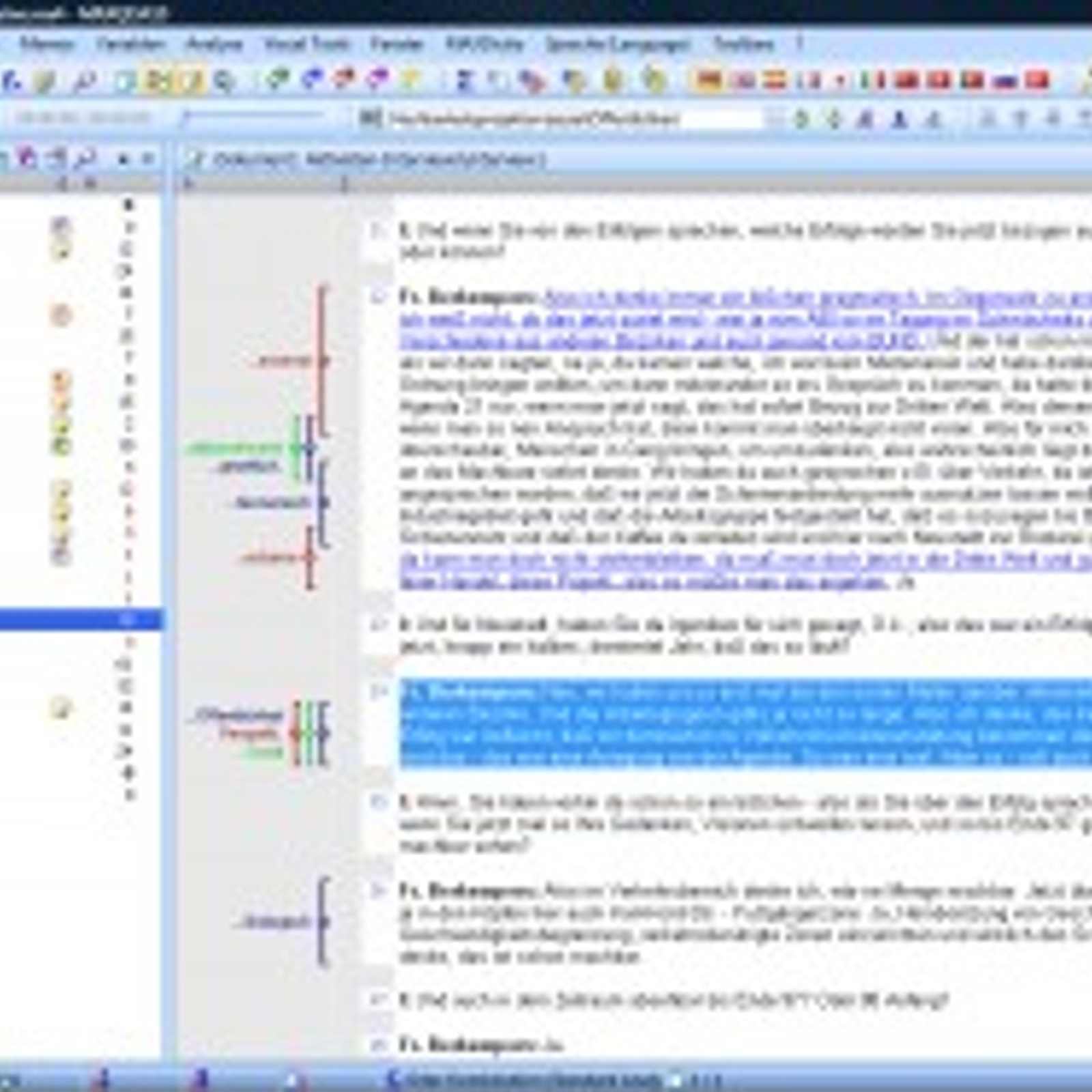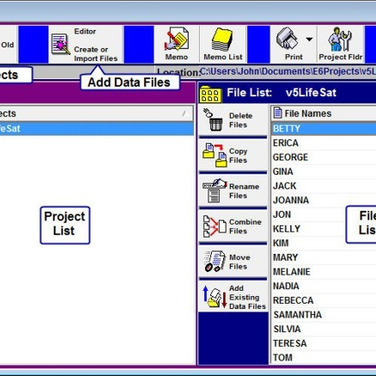Raven's Eye (is a secure online natural language analysis and computer-assisted qualitative data analysis software (CAQDAS) program. It's designed to work uniformly on both.
Jun 03, 2020 Qualitative Software Overview and Comparison by GMU Data Services; CAQDAS (Computer Assisted Qualitative Data AnalysiS) Networking Project. Software-focused site by the Sociology Department at the University of Surrey; Includes help on choosing software and news on the most popular packages. Links Content Analysis. Great collection of QDA software at the university of Oulu (Finland) textanalysis.info – qualitative data analysis; DiRT Directory (formerly dirt.projectbamboo.org).
Computer-assisted (or aided) qualitative data analysis software (CAQDAS) offers tools that assist with qualitative research such as transcription analysis, coding and text interpretation, recursive abstraction, content analysis, discourse analysis,[1]grounded theory methodology, etc.
Definition[edit]
CAQDAS is used in psychology, marketing research, ethnography, public health and other social sciences. The CAQDAS networking project[2] lists the following tools a CAQDAS program should have:
- Content searching tools
- Coding tools
- Linking tools
- Mapping or networking tools
- Query tools
- Writing and annotation tools
Comparison of CAQDAS software[edit]
| Application | Type | License | Source | Last Release | Analyses | OS Supported | Tools |
|---|---|---|---|---|---|---|---|
| Aquad | Client | Free – GPL | Open | 2017-02 | Text, Audio, Video, Graphics | Windows | Coding, Sequence Analysis, Exploratory Data Analysis |
| ATLAS.ti | Client | Proprietary | Closed | 2019-03 | Text, Audio, Video, Graphic, Social Networks | Windows, macOS, iOS, Android, Cloud (web-based) | Coding, Aggregation, Query, Visualisation |
| Cassandre | Web-based/server | Free – GPL | Open | 2018-10-09 | Text | All (java-based) | Coding |
| CLAN | Client | Free – GPL | Open | 2019-06-10 | Text | Windows, macOS, Linux | Coding |
| Coding Analysis Toolkit (CAT) | Web-based | Free – GPL | Open | 2014-06-28[3] | Text | All (web browser) | Coding |
| Compendium/CompendiumNG[4] | Client | Free – LGPL | Open | 2014-02 | Text | All (java-based) | Coding |
| Dedoose | Web-based | Proprietary | Closed | 2016-12 | Text, Audio, Video | All (web browser) | Coding, Query, Visualisation, Statistical Tools |
| ELAN | Client | Free – GPL | Open | 2018-12-12[5] | Audio, Video | Windows, macOS, Linux | Coding |
| KH Coder | Client | Free- GPL | Open | 2015-12-29[6] | Text | Windows, macOS, Linux | |
| MAXQDA | Client | Proprietary | Closed | 2019-02-05 | Text, audio, video, pictures, webpages, social networks | Windows, macOS | Coding, Aggregation, Query, Visualisation, Statistical Tools |
| NVivo | Client | Proprietary | Closed | 2017-02 | Text, audio, video, pictures, webpages | Windows, macOS | Coding, Aggregation, Query, Visualisation |
| QDA Miner | Client | Proprietary | Closed | 2016-11 | Windows | ||
| QDA Miner Lite | Client | Proprietary | Closed | 2017-01-12 | Text | Windows | Coding |
| Qiqqa | Client | Proprietary | Closed | 2016-09 | Windows, Android | ||
| Quantitative Discourse Analysis Package (qdap) (R package) | Client | Free- GPL | Open | 2019-01-02[7] | Text | Windows, macOS, Linux | Word extracting, statistical analysis, visualization |
| Quirkos | Client | Proprietary | Closed | 2020-02[8] | Text | Windows, macOS, Linux,[9] Android | Coding, Query, Visualisation |
| RQDA (R package) | Client | Free- GPL | Open | 2018-03[10] | Text | Windows, macOS, Linux | Coding, Aggregation, Query, Visualisation |
| Transana | Client | Proprietary, used to be GPL[11] | Closed | 2017-11[12] | Text, Audio, Video | Windows, macOS | Coding |
| XSight | Client | Proprietary | Closed | 2006 (abandoned) | Windows |
Project Exchange Format[edit]
In March 2019 the Rotterdam Exchange Format Initiative (REFI) launched a new open exchange standard for qualitative data called QDA-XML.[13] The aim is to allow users to bring coded qualitative data from one software package to another. Initially support was included in Atlas.ti, QDA Miner, Quirkos and Transana, with implementation pledged from Dedoose, MAXQDA and NVivo.[14] Although this was not the first standard to be proposed, it was the first to be implemented by more than one software package, and came as the result of a collaboration between vendors and community representatives from the research community. Previously there was very little capability to bring data in from other software packages.
Pros and cons[edit]
Such software helps to organize, manage and analyse information.[15] The advantages of using this software include saving time, managing huge amounts of qualitative data, having increased flexibility, having improved validity and auditability of qualitative research, and being freed from manual and clerical tasks. Concerns include increasingly deterministic and rigid processes, privileging of coding, and retrieval methods; reification of data, increased pressure on researchers to focus on volume and breadth rather than on depth and meaning, time and energy spent learning to use computer packages, increased commercialism, and distraction from the real work of analysis.[16]
See also[edit]
References[edit]
- ^Paulus, Trena M.; Lester, Jessica Nina (2016). 'ATLAS.ti for conversation and discourse analysis studies'. International Journal of Social Research Methodology. 19 (4): 405–428. doi:10.1080/13645579.2015.1021949.
- ^'CAQDAS'. Retrieved 28 November 2011.
- ^https://sourceforge.net/projects/catoolkit/
- ^'CompendiumNG website'. Retrieved 22 February 2017.
- ^'ELAN Release Notes – The Language Archive'. tla.mpi.nl. Retrieved 2019-03-27.
- ^'KH Coder download site'. Retrieved 11 March 2017.
- ^'qdap GitHub website'. Retrieved 18 February 2017.
- ^'Quirkos 2.3 with live team work is now here'. Retrieved 5 March 2020.
- ^'Quirkos for Linux'. Retrieved 11 September 2015.
- ^http://rqda.r-forge.r-project.org/
- ^'Transana website'. Retrieved 2 February 2016.
- ^'Transana website'. Retrieved 19 May 2017.
- ^'Launch – Codebook Exchange'. Retrieved 19 March 2019.
- ^'Products – Project Exchange'. Retrieved 19 March 2019.
- ^Banner, DJ; Albarrran, JW (2009). 'Computer-assisted qualitative data analysis software: a review'. Canadian Journal of Cardiovascular Nursing. 19 (3): 24–31. PMID19694114.
- ^St John, W; Johnson, P (2000). 'The pros and cons of data analysis software for qualitative research'. Journal of Nursing Scholarship. 32 (4): 393–7. PMID11140204.
External links[edit]
- The CAQDAS networking project maintained by the University of Surrey offers advice and reviews on various software packages.
RDQA is a R package for Qualitative Data Analysis, a free (free as freedom) qualitative analysis software application (BSD license). It works on Windows, Linux/FreeBSD and Mac OSX platforms. RQDA is an easy to use tool to assist in the analysis of textual data. At the moment it only supports plain text formatted data. All the information is stored in a SQLite database via the R package of RSQLite. The GUI is based on RGtk2, via the aid of gWidgetsRGtk2. It includes a number of standard Computer-Aided Qualitative Data Analysis features. In addition it seamlessly integrates with R, which means that a) statistical analysis on the coding is possible, and b) functions for data manipulation and analysis can be easily extended by writing R functions. To some extent, RQDA and R make an integrated platform for both quantitative and qualitative data analysis.
Through the GUI, RQDA can:

Through R functions, it can:
You can use help(package='RQDA') to see more functions of the RQDA package.
 Step five, Launch RQDA using command library(RQDA)
Step five, Launch RQDA using command library(RQDA) from within R. Then you can see the RQDA GUI. For Debian Linux users, there is a apt repositories, you can follow the guidelines there.>
from within R. Then you can see the RQDA GUI. For Debian Linux users, there is a apt repositories, you can follow the guidelines there.>For non-R-users who use Windows, you can download a rar file from Baidu Yun Pan, extract it to, say, c:. Then you can launch the RQDA by double clicking the RQDA.bat file. This instruction has been tested on OS X EI Capitan (2016/06/23).
Old instruction for Yosemite users.
User contributed documentation
I have put a lot of effort in this project. I appreciate if you can cite this software in your research. You can use citation('RQDA') to get this citation.
HUANG Ronggui (2016). RQDA: R-based Qualitative Data Analysis. R package version 0.2-8. http://rqda.r-forge.r-project.org/
Qualitative Research Analysis Software
RQDA 0.2-8 is released on CRAN (2016-12-12). The most important changes include profile matrix (Kuckartz, 2014) and Portuguese translation, among others. Unfortunately, this release is not compatible with RSQLite 1.1.0, which means that you need to downgrade RSQLite to 1.0.0 to make RQDA works properly. This problem will be fixed in development version on GitHub.
RQDA 0.2-5 is released on CRAN (2014-03-26). This update is in compliance with CRAN policies, but has no significant new features. JRE is required to used rjpod enhancement.
RQDA 0.2-3 is released with several new features (2012-12-12).
rmmseg4j 0.1-0 is released to CRAN (2012-06-18)
RQDA 0.2-2 is now on CRAN (2011-12-27)
Two new packages (rsmartcn, rmmseg4j) have been added, which segment Simplified Chinese into words seperated by space.
RQDA 0.2-1 is now on CRAN (2011-09-10)
RQDA 0.2-0 is now on CRAN (2010-10-20)
RQDAtm 0.1-0 works now. It bridges RQDA and tm (rev 313) (2010-04-26).
Tools For Qualitative Data Analysis
RQDA 0.1-9 is now on CRAN (2010-02-28). There is a bug, and the solution is here.
Top Qualitative Data Analysis Software For Mac
RQDA 0.1-8 is now on CRAN (2009-09-20)
RQDA 0.1-7 is now on CRAN (2009-04-28)
RQDA 0.1-6 is now on CRAN (2008-12-30)
RQDA has been actively developed. You can click here to see the new features. There are few known-bugs, click KnownBugs for details.
Qualitative Software Analysis Programs
Homepage of the author.Qualitative Data Analysis Software Free
Main windows under Vista and under Debian Linux
Reading File
File Memo
File Categories window under Vista and Debian Linux
Codes list window under Vista and under Debian Linux
Code Categories window under Vista and Debian Linux
Coding
Retrieval
Cases window under XP and under Debian Linux
Attributes window under Debian Linux
Journals window under Debian Linux
Settings window under XPand under Debian Linux